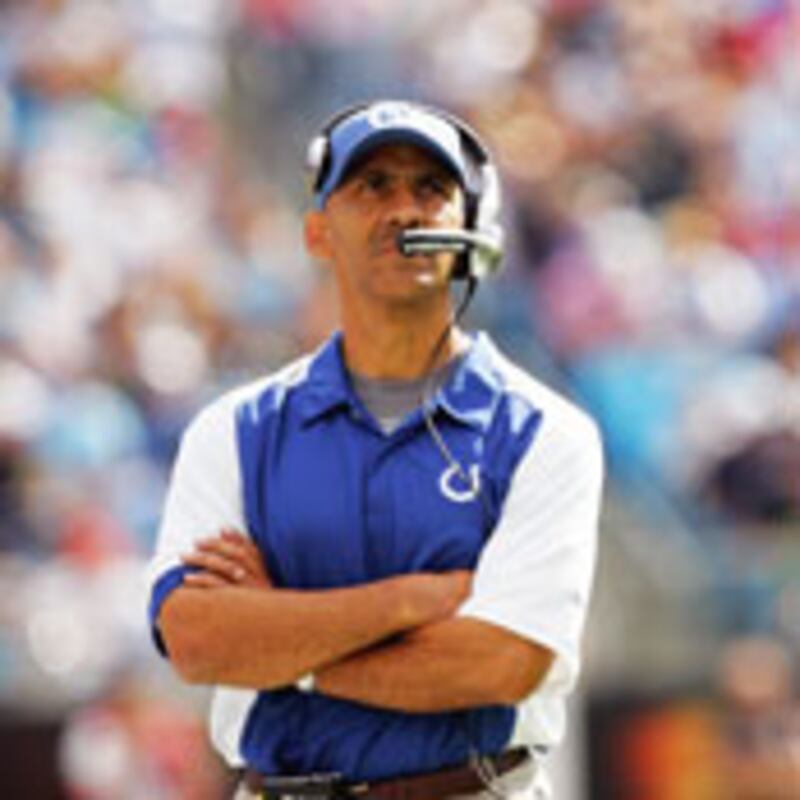
No man in football is quite as deified as Tony Dungy. The former Super Bowl-winning coach of the Indianapolis Colts has made even the great Vince Lombardi look like a Pop Warner prophet. ESPN calls Dungy “the moral compass of American sports.” His efforts to rehabilitate fallen players—those accused of assault and dog-fighting—are becoming legendary. The only question is: Who’s really benefiting from the glow of Dungy’s halo?
“Football is a vocation and an opportunity for ministry,” Dungy has written. “But it’s not a life.”
Dungy, who is an evangelical Christian, turned his life to good works after he retired from NFL coaching in 2008. He volunteered to mentor Michael Vick, the Atlanta Falcons quarterback who was emerging from 18 months spent in prison for running a dog-fighting operation. The Web site Deadspin wondered if Dungy had become football’s Jesse Jackson, a gridiron minister “rushing to the scenes of crimes to give voice to the voiceless?” Indeed, last season, Dungy was mentoring LeGarrette Blount, a University of Oregon running back had been suspended after punching an opposing player after a game.
• The 44 Most Extreme Super Bowl Snacks • Watch: 12 Banned Super Bowl Ads Dungy has another pulpit: as a talking head on NBC Sports. His boss, Dick Ebersol, has said, “He’s ministering all the time.” Dungy published two books—including the No. 1 bestseller Quiet Strength: The Principles, Practices, and Priorities of a Winning Life—and, perhaps a first for a football coach, a monogrammed edition of the New Testament. There’s also a Tony Dungy men’s bible study guide for $9.99.
“I think people can look at my motives and say that they’re pure,” Dungy told ESPN. “That’s why I resonate with guys.”
But perhaps the best place to observe Dungy’s motives—and their consequences, intended and not—is Albuquerque, New Mexico. Last September, the University of New Mexico football program found itself embroiled in a sports PR nightmare. The Lobos’ head coach, Mike Locksley, had allegedly choked and punched one of his assistant coaches, J.B. Gerald, during a staff meeting. The incident was a made-for-ESPN melodrama: The school was embarrassed, and Locksley, a first-year coach, looked completely out of his depth. He was suspended by the university for 10 days.
Then, out of the desert, Dungy appeared. Just as he had Michael Vick, the coach took on Locksley as a mentee. The story quickly morphed from one of violence and scandal into one of redemption—another lost soul taken under Dungy’s wing. Locksley later said, “I see Coach Dungy being a guy with a wealth of experience and knowledge, not just in football, but in life.”
How had Dungy found his new disciple? Well, that’s where the story becomes a parable about the difference between rehabilitating a person and rehabilitating a reputation. Six weeks after the Locksley incident, the Albuquerque Journal unearthed an email that said Dungy had been called to mentor duty by a communications firm, Sports Media Challenge. According to its Web site, Sports Media Challenge has worked with athletes like Peyton Manning, Dungy’s former quarterback, to teach them to “maximize public exposure while minimizing its risks.” Here the PR risk-reward factor seemed clear: Who better to vouch for a fallen coach than football’s resident saint?
In an interview, Kathleen Hessert, the president of Sports Media Challenge, confirmed that she had contacted Dungy. “I reached out to Tony there,” Hessert said. “I said, ‘Tony, I think you could be of help, would you work with [Locksley]?’ And he said, ‘Yes.’”
Both Hessert and the university insist Dungy didn’t, and wouldn’t, take a dime for mentoring Locksley. And Hessert said that she valued Dungy’s mentoring skills far more than any image-buffing his presence might have produced. But it’s clear, as with all of Dungy’s godly interventions, that his good deeds are far more complicated than ministering man-to-man. And when you throw moral authority into the modern sports-marketing machine, there are downsides, too.
Dungy, who is 54, has always been a defiantly pious figure in the NFL. As a Pittsburgh Steelers safety in the good-timing, pill-popping NFL of the 1970s, he was a redoubt of propriety. Dungy didn’t drink or smoke. He preferred studying the Bible with his teammates. He barely dated; he said he wasn’t interested in going out with women so much as marrying one. Later, as a head coach with Tampa Bay, and then the Indianapolis Colts, Dungy also cut a chaste figure. “Because of my Christian witness, I don’t lash out or make a scene with the officials,” he has written. He didn’t use profanity in practice. Even after summiting the NFL in 2006—he was the first African-American head coach to win the Super Bowl—Dungy was apt to write, “Football is a vocation and an opportunity for ministry. But it’s not a life.”
Today, it is nearly impossible to track down every player Dungy has sought to help, every injustice he has sought to undo. For instance, Charlotte Westerhaus, the NCAA’s Vice President for Diversity and Inclusion, told me that Dungy has become a kind of de facto agent on behalf of minority college coaches, who lag behind their professional peers in getting head coaching jobs. When the University of Louisville was looking to hire a coach this December, Dungy played a role in convincing them to hire Charlie Strong, an African-American, as the school’s head football coach.
“The athletic director did reach out to him,” said Westerhaus, “and as a result of that, and Tony’s understanding of our hiring processes, there was a coach of color hired there.” She said Dungy does that job for free, too.
You can believe that Dungy’s good works are absolutely sincere. (He has said he helps even those athletes and coaches who have no interest in Christianity.) But you can also believe that Dungy, having worked in the media glare of the NFL for years, knows that mentoring is not so simple.
For instance, Dungy often says he likes to work within the system. It has been a mantra since his high-school days, when he quit his Jackson, Michigan, prep football team because he thought an election for team captain was marred by racism. Dungy later rejoined the team, at great personal distress, out of a sense of duty.
Problem is, Dungy’s insistence on working within the system often lets the system off the hook. Michael Vick is a great example. What Vick needed after leaving federal prison wasn’t just an advocate with the press; it was an advocate in the NFL. Commissioner Roger Goodell made Vick come on bended knee to apply for reinstatement. The quarterback was humiliated and forced to personally apologize. Even with that, and no evidence Vick would hurt a poodle, Goodell suspended Vick for two more games before he could play for the Philadelphia Eagles. This is the kind of sniggering authority figure that should not be worked with but laughed at. By negotiating with Goodell, Dungy merely dignified his punishment regime.
The second problem is that Dungy’s saintliness often obscures the facts of the case. The Mike Locksley fiasco at New Mexico was actually quite haunting. The assistant coach, J.B. Gerald, told ESPN that on September 20, Locksley jumped into his lap and “put his hands around my collar and neck and was choking me. He's pulling me up out of the chair, and I grabbed his hands so I could get them off my neck.”
As other coaches tried to intervene, Gerald said that Locksley “was throwing punches and hit me right in the mouth. I could taste the blood in my mouth.” (Locksley admitted there was pushing and shoving but denied punching or choking Gerald.) The upshot was that without such a high-profile mentor, J.B. Gerald, another young, African-American coach, was finished at New Mexico. (Gerald reportedly asked for a $500,000 settlement.) The question is whether Dungy had saved Locksley’s soul or merely saved his job.
For the University of New Mexico, though, Dungy’s mere presence produced nothing but a mountain of good publicity. Kathleen Hessert, of Sports Media Challenge, said she has a proprietary Internet search engine that measures buzz (how much a sports figure is being talked about) and the sentiment (how positive or negative the talk is). And once Dungy reached out to Locksley, both scores were off the charts.
“The buzz was a 10 and the sentiment was highly positive,” Hessert said. “People were saying, ‘Obviously, [Locksley is] getting the help he needs to be a positive coach here and obviously he’s serious about it, getting somebody like Tony Dungy to mentor him.’”
It can be said without irony that, for certain football players and coaches, Tony Dungy is a blessing, and that we are all witnesses.
Bryan Curtis is a senior editor at The Daily Beast. His story about his grandfather’s softball career is in The Best American Sports Writing of 2009.






